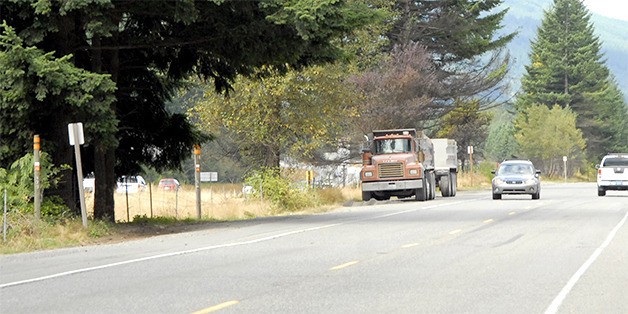It’s official, but not effective just yet; commercial trucks can’t park on city streets. Amendments to the city code on adopted by the North Bend City Council on Tuesday, Aug. 6, specifically ban parking on six city streets and in any multi-family residential area in the city for commercial trucks, except as needed for making deliveries, permitted construction projects, or emergency closures of the interstate highway.
The penalty for parking on city streets outside of those circumstances will be $250.
North Bend’s action is both an attempt to address citizen concerns, and a gesture intended to draw attention to the city’s ongoing parking problems.
“The goal is to see if the state will step up to help address these issues,” North Bend City Administrator Londi Lindell said by phone last week.
Travel Center of America in North Bend is the last bad-weather stop for eastbound trucks on I-90, since the next nearest truck stop is 55 miles and a mountain pass away in Cle Elum. For westbound traffic, it’s the last stop before Seattle, 30 miles away. Drivers, faced with increasingly strict federal rules about how long they can operate without resting, have clogged city streets during required stops, when TCA reaches its capacity, 140 spaces, 17 of which are reserved or handicapped-accessible only.
Some of the streets most affected by overflow truck parking are North Bend Way and Southeast 140th Street, which are now on the banned list, Lindell said. “The hope is if they (trucks) can’t park on city streets any longer they’ll park on I-90 and the ramps, and hopefully the appropriate agency will get involved.”
Meanwhile, though, the ordinance will create bigger problems for the drivers, says Tom Kemp, pastor at the truck stop’s Victory Chapel. He asked the council, “Since it’s federal law that truck drivers must cease their driving after 11 hours, and seeing as how there is no other commercial truck parking in King County, where do you anticipate these trucks parking? To make them move after they’ve stopped puts them in a hard way between your $250 fine and breaking federal law.”
Councilman Ross Loudenback defended the ordinance, saying it was in response to “a number of complaints that have come from the citizens,” and pointing out that North Bend has been seeking a commercial truck parking solution for years.
“We have reached out to every available agency that we can imagine, the port, the state, the freight mobility board,” said Loudenback. “We’ve asked them all to help us address this issue, and it’s fallen on deaf ears. They are not willing to help mitigate any of the issues that we’ve identified within this ordinance.”
According to the amended city code, truck parking is banned, with exceptions for deliveries, construction and emergency road closures, on: North Bend Way from the I-90 Exit 34 to Main Avenue; Cedar Falls Way from the North Bend Way roundabout to 436th Avenue Southeast; 436th Avenue Southeast from North Bend Way to the southern city limit; Southeast 140th Street from North Bend Way to Southeast Middle Fork Road; 468th Avenue Southeast from I-90 Exit 34 to Southeast Middle Fork Road; Southeast 146th Street from 468th Avenue Southeast, east to the city limit; and in and multi-family residential zone.
Several streets have also been designated truck routes, including stretches of Bendigo Boulevard, Boalch Avenue Northwest, North Bend Way, Ballarat Avenue Northeast, Northeast 12th Street, 436th Avenue Southeast, 468th Avenue Southeast and Southeast 146th Street.
The law is now on the city’s books, but won’t be enforced until the city posts signs about the new ordinance, which should be in the next 30 to 60 days, Lindell said.
“Signage is very important,” she said. “Until those signs go up on North Bend Way, we aren’t going to start collecting any fines.”

Trucks will increasingly have to compete for the 120-plus spaces at the Travel Center of America site in east North Bend, once fines come into effect.



